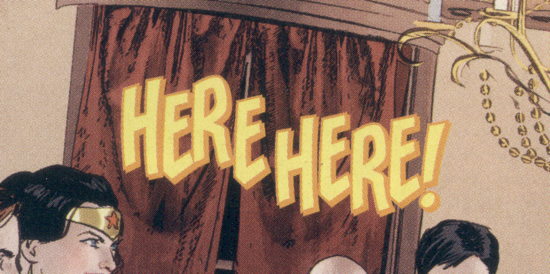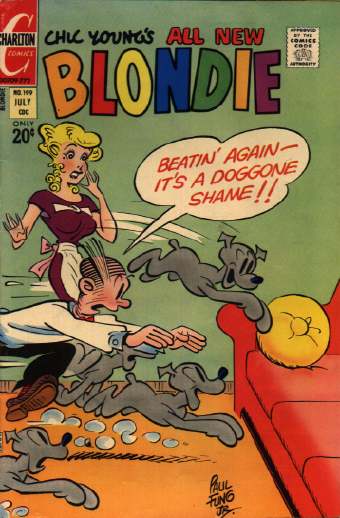I’m sure I made a typo somewhere in this post which negates my entire point.
So there I was, reading the long-awaited final issue of Dark Nights: Metal, new this week from DC Comics, a series that has been a hoot-and-a-half pretty much all the way through, until I come to this. Here, at a gathering where one person has just given an inspirational speech, the others cry out their approval with the traditional cheer of

…by which I assume they mean “hear, hear,” the shortened form of the older phrase “hear him, hear him,” which makes it even more obvious that somebody must have screwed up somewhere. It’s very much an “editing by spellcheck” error, like the kind that was prevalent at the original early ’90s Valiant Comics, which never met a misused “it’s” it didn’t like.
I mean, yeah, okay, it happens. Everyoone makes mistaaks, but it’s especially embarrassing at the end of a highly-regarded, high profile event series for which they’re dinging you a fiver per copy. As these things go, it’s fairly minor…at least the pages aren’t out of order, or the cover doesn’t have an enormous spelling mistake in big red letters:

Anyway, I found that Dark Nights typo distracting. Had it been, like, in someone’s word balloon, maybe I wouldn’t have been bothered as much, but there it is, in attention-grabbing bold letters, floating over the heads of the characters, poking me directly in my eyes. I know some people do argue for the “here, here” spelling, but my calm and rational response is that they’re wrong and must be shunned forever.
As for the comic itself, aside from all that: loud and fun nonsense, that’s taking another shot at making a certain DC Comics second-stringer usable again, which may or may not work this time. We’ll see. Also, in terms of “introducing new characters and teams and leading into new comic book series,” I give it a 0.75 on the “Last Issue of Millennium” Blatancy Scale, which I think is more than fair.








Mentioning Millennium reminds me of the “Birmingham, Fascist England” caption, which, yeah, copy editors would probably be a good thing.
Every single time that caption makes me sorta cringe-laugh.
This is not really the sort of thing you mean, but one mistake that repeatedly annoyed and distracted me, back in the 1970s, was Steve Englehart’s unshakable belief that the phrase “deus ex machina” translated into “machine with the powers of a god.” He did this in “The Avengers” and “Justice League,” and probably elsewhere that I am forgetting, always using it to describe an especially powerful robot or computer.
For those needing an explanation: The phrase comes from the theater, and refers to a plot contrivance that solves all of the characters’s problems at the last minute. It goes back to ancient Roman drama, when the contrivance would literally be the intervention of a god, played by an actor who was lowered onto the stage by wires–the “machine.”
Or, if you need this explained: Steve Englehart was a comic book writer who was once highly regarded.
Steve Englehart was most highly regarded by himself. Just ask him. Or in fact, don’t ask, just wait five minutes and he’ll tell you.
Along these lines, I will bring up again something I have mentioned before: there seems an almost universal assumption among comics writers that “changeling” means a person able to alter his appearance. No. It means someone or something who has taken the place of another, preferably without the substitution having been noticed. More specifically, it refers that a goblin baby that is left behind when the goblins steal your child, but most of us seldom have opportunity to use it that way.
Another weird belief that was once common among comics writers (also writers of books, movies, radio shows, and cartoons, but seemingly most broadly accepted in comics) was that ventriloquism involved a literal projection of the voice–that is, a ventriloquist is able to make his voice originate from outside of his body. I could not count the numbers of comics stories I have read in which the hero was able to “throw his voice” into another room, or the villain’s mouth, or a passing dog. (Do I need to explain how it really works? What ventriloquists do, basically, is minimize their lip movement. The human mind is so constructed that, if one hears a voice, and sees both a person whose mouth does not seem to be moving, and a dummy whose mouth opens and closes more or less in sync with the voice, then one “hears” the voice as coming from the dummy. Even if you know how this is done, and you can make out the vent’s vestigial lip movements, you will still associate the voice with the dummy. There has to be that synchronization, however. One cannot “throw” one’s voice to another person if that person is not saying the same thing one is, so all those stories in which the hero makes the villain seem to confess his crimes or turn on his gang are nonsense.)
Okay, everyone, let’s lay off Steve a bit!
Their, Their Mike…it’s gonna be okay
Turan, Paul WInchell told the story in his book Ventriloquism for Fun and Profit, of the time he did his act for radio but the mike wasn’t picking up his dummy’s side of the conversation. Turned out the sound engineer was moving the mike over to the dummy for that bit.
I was reading an Archie Comics Digest about 15 years ago and Jughead was riding a bike, going somewhere in a hurry. The sound effect was “PEDDLE PEDDLE PEDDLE.”
I’m still mad about it.
philip, that reminds me of the hooker who got to her assignments by bicycle.
She pedaled it all over town.
Brad, that is some graduate-level dad jokery right there. I tip my dad hat to you.